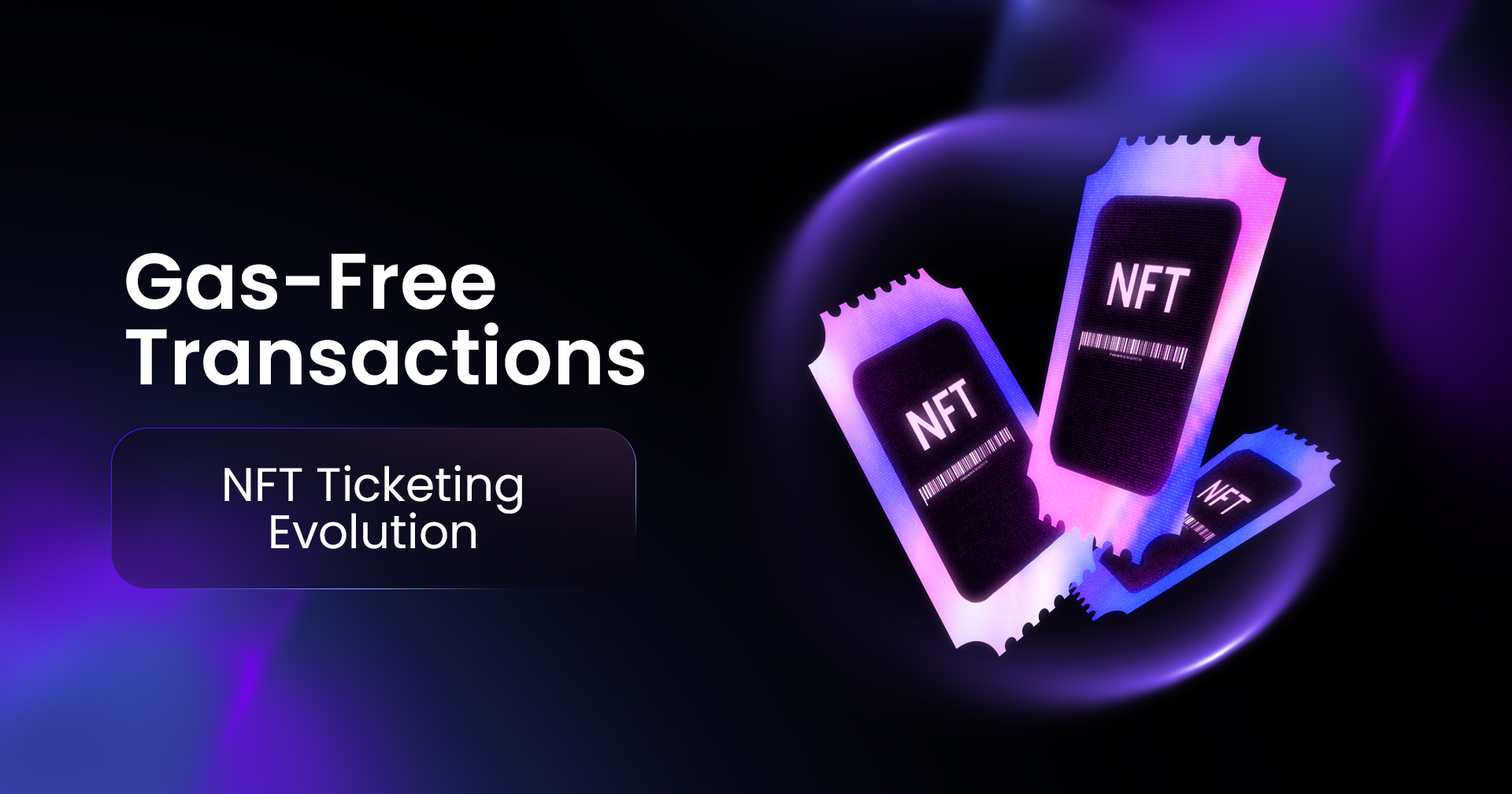
Gas-Free Transactions: The User Experience Is Affected by Widespread Crypto Adoption
As blockchain technology develops, gas-free transactions are a crucial development that tackles transaction costs, one of the biggest obstacles to broad adoption. Businesses in the NFT ticketing industry can significantly improve user experience and increase market reach by comprehending and implementing gas-free solutions.
Comprehending Transactions Without Gas
When interacting with decentralized applications, end users no longer need to pay blockchain network fees directly thanks to gas-free transactions, also known as "gasless transactions". Users of traditional blockchain transactions must pay "gas fees", which are the computational expenses required to process and validate network transactions. User experiences have historically been significantly hampered by these fees, which are normally paid in the native cryptocurrency of the network (ETH for Ethereum, for example).
Instead of going away, these expenses are incurred in a gas-free implementation.
- subsidized by the platform or application developer
- In charge of specific relayer networks
- mediated by means of meta-transaction protocols
- combined with the primary purchase fees
- offset by the efficiency of batch processing
Smart contract architectures that isolate transaction construction from submission, cryptographic signatures that permit third parties to submit transactions on a user's behalf, and specialized infrastructure that oversees the financial relationship between users and validators are some of the technical mechanisms that make this approach possible.
The Development of Transaction Economics
In the past, gas prices have hampered user experiences, especially when there is network congestion and expenses can suddenly increase. For NFT ticketing platforms, these erratic fees have the potential to interfere with important high-volume sales events, such as event launches.
Gas-free transactions fundamentally alter this paradigm by:
- keeping end users unaware of complexity
- establishing foreseeable operating costs
- simplifying the onboarding procedure
- allowing for widespread adoption
- supporting projects aimed at scaling
- establishing advantages over competitors
- increasing the speed of transactions
Methodologies for NFT Ticketing Implementation.
For NFT ticketing platforms, a number of architectural strategies have been developed to enable gas-free transactions, each with unique benefits.
- Metatransactions
- Solutions at Layer 2
- Relays that run without gas.
- models of sponsorship
- The mechanisms of batching
- Side chains
- Optimizations for EIP-1559
- Abstracting accounts.
Account Abstraction in zkSync: A Case Study
The account abstraction used by zkSync offers yet another striking illustration of gas-free transactions in operation. By deducting fees from the contract balance itself, this method enables users to engage with smart contracts without having to pay for gas up front.
This model was used by gaming platform Immutable for their 2023 gaming convention ticketing system. The following were included in the implementation.
- All transaction fees are covered by smart contract paymasters
- The need for a wallet is eliminated by social login integration
- Blockchain operations are invisibly connected to fiat payment processing
- Automated fee optimization that adapts to network circumstances
Analysis conducted after the implementation revealed that 89% of users finished their transaction on their first try, up from 46% with their prior wallet-based system.
Chain Atlas Gas-Free Solution: A Case Study
Chain Atlas has emerged as a pioneering platform offering comprehensive gas-free transaction infrastructure specifically optimized for NFT ticketing ecosystems. Their implementation leverages a hybrid approach combining meta-transactions with a proprietary relayer network to deliver seamless user experiences.
In 2024, a major music festival organizer utilized Chain Atlas to handle over 50,000 NFT ticket mints and transfers during their multi-day event series. The implementation featured:
- Zero gas fees for end-users across primary sales and secondary market transfers
- Cross-chain compatibility allowing tickets to be moved between Ethereum, Polygon, and other EVM-compatible networks without gas concerns
- Transparent custody solutions enabling users to claim full ownership of their NFT tickets without technical knowledge
- Advanced anti-scalping measures enforced through gas-free verification checkpoints
- Real-time analytics dashboard tracking ticket ownership and transfer patterns
Post-implementation analysis showed that the Chain Atlas solution reduced transaction abandonment rates by 67% compared to previous blockchain ticketing attempts, while the seamless experience led to a 43% increase in customer satisfaction scores among festival attendees.
Considerations for Business Implementation
Companies should consider the following when introducing gas-free transactions for NFT ticketing solutions.
Technical Requirements
- Smart contract design
- Security protocols
- Network selection
- Scalability needs
- Recovery mechanisms
- Monitoring tools
- Fee estimation
- API integration
- Upgrade paths
Economic Factors
- Cost forecasting
- Revenue modeling
- Fee structures
- Risk management
- Value capture
- Market positioning
- User incentives
- Competitive analysis
The Implementation Model for Starkware
For NFT ticketing platforms, the gas-free implementation of Starkware provides especially insightful information. Their method drastically lowers per-transaction costs by batching hundreds of transactions into a single on-chain verification using validity proofs.
A Miami auction house used Starkware's solution to create a tiered ticketing system with dynamic benefits for their VIP event series. The implementation included the following.
Instant transaction confirmation without gas fees Seamless secondary market transactions without additional costs Programmable royalties enforced on all resales Dynamic ticket upgrading without prohibitive transaction fees.
According to the platform, removing gas fees increased secondary market activity by 28% and produced extra royalties that, within eight months, reimbursed implementation expenses.
New Standards for the Future
Standardized methods for gas-free transactions are still being adopted by the industry. Account Abstraction via Entry Point Contract, or EIP-4337, is a noteworthy development that will allow for increasingly complex gas-free implementations on networks that support Ethereum.
The best course of action for NFT ticketing companies is to keep up with these advancements while putting the solutions that are currently available into practice. As these technologies develop and become more standardized, the competitive advantage gained from enhanced user experience and increased market access will probably exceed implementation costs.
Through gas-free implementations, NFT ticketing is transformed from a specialized technology to a widely used solution that can cater to a variety of audiences, regardless of their level of blockchain expertise.